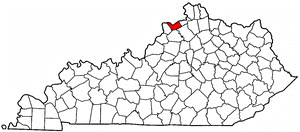The CCC was a work relief program for young men from unemployed families,
established on March 21, 1933, by U.S. President
Franklin D. Roosevelt. As part of Roosevelt's
New Deal legislation, it was designed to combat
unemployment during the
Great Depression. The CCC became one of the most popular
New Deal programs among the general public and operated in
every U.S. state and several territories. The separate
Indian Division was a major relief force for Native American
reservations.
Initial opposition to the program was
primarily from organized labor, but as the unemployment rate
fell, so did the need for the CCC. The CCC lost importance
as the Depression ended; and following the attack on Pearl
Harbor by Japan in 1941, national attention shifted away
from domestic issues in favor of the war effort. Rather than
formally disbanding the CCC, the 77th United States Congress
ceased funding it after the 1942 fiscal year, causing it to
end operations.






































